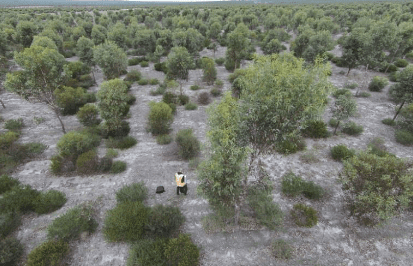
ACCUs generated by the Peniup Private Conservation Reserve Project were purchased by CBH to offset any emissions generated in the production of the 10,000t of malting barley.
WESTERN Australian co-operative CBH Group has become the first grain marketer in Australia to achieve carbon-neutral certification for a product under the Federal Government’s Climate Active program.
Climate Active is a voluntary program that provides organisations that demonstrate their commitment to measuring, reducing, and offsetting emissions with carbon-neutral certification.
As part of a trial, CBH’s marketing and trading division teamed up with 12 WA growers, agricultural consultants Farmanco, and independent contractors Ben White and Richard Brake to certify 10,000 tonnes of malting barley.
The barley will be sold to customers to produce about 200 million bottles of beer.
CBH Group sustainability lead Jane Wardle said it was a milestone achievement for the co-operative, which is committed to connecting WA growers with high-value customers.
“As a key global exporter of grain, we’re noticing significant growth in demand for sustainably produced grain,” Ms Wardle said.
“It’s increasingly critical for our customers to quantify and reduce the level of emissions produced within their supply chains to reduce their carbon footprints and meet consumer expectations.
“It presents an exciting opportunity for WA growers, who are already recognised as relatively low carbon emitters compared to several competitors, and are well positioned to become key suppliers into this growing market.”
To achieve the Climate Active Carbon Neutral Standard, growers involved in the trial worked alongside their consultants to calculate the carbon emitted in the production of the barley from paddock to port.
These 12 growers were each interested in learning more about their farm’s greenhouse gas emissions and carbon measurement before becoming involved in this trial.
“Greenhouse gases generated through grain growing make up a major portion of total emissions in the production of food
“Decarbonising food and beverage products requires partnership across the complete supply chain, and this trial demonstrates how WA growers and industry can work together to unlock new and valuable opportunities, while limiting our environmental impact.”
Back-up from Peniup
Australian Carbon Credit Units generated from the Peniup Private Conservation Reserve Project in WA’s Great Southern were purchased to offset any remaining emissions generated from grain production through to delivery to a CBH port.
“In purchasing these units, we felt it essential to support carbon projects within the WA grainbelt to ensure that the co-benefits of this project remained in the area where our growers operate.”
CBH Group will continue to explore opportunities to reduce Scope 1 and 2 emissions by 50 percent by 2030 as part of its sustainability plan released last year.
Peniup is described in the Climate Active public disclosure statement as a biologically diverse reforestation project situated between the Stirling Range and Fitzgerald National Parks in the southern section of the Wheatbelt.
The area was purchased in 2008 and chosen due to its significance in creating a corridor
between two significant WA biodiversity “hotspots”.
Corridors are critical for maintaining ecological processes, including allowing for the movement of
plants, animals and the continuation of viable populations.
By providing landscape connections between more extensive habitat areas, corridors enable
migration, colonisation and interbreeding of plants and animals.
CBH has chosen to offset our grain emissions using credits generated from this project due to the project’s co-benefits to the communities and environments in the areas our co-operative farming members live and operate within.
Included tin the carbon accounting for the 10,000t of barley are: lime; urea; fertiliser; burning and crop residues; leaching and run-off; atmospheric deposition; herbicides and pesticides; Scope 1-3 emissions associated with growing the barley; road and rail freight; total net electricity; diesel and unleaded petrol plus petroleum-based oils and greases; LPG and natural gas; solvents, and acetylene.
Source: CBH Group, Climate Active

HAVE YOUR SAY